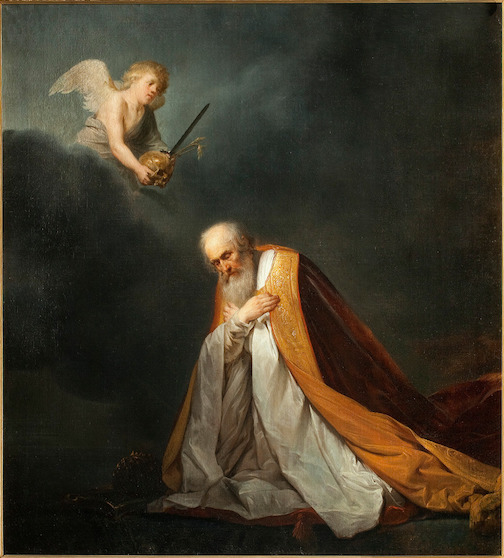The past several weeks have been a real gut punch for Catholic apologists. The McCarrick scandal, terribly tainting one of the highest offices of the Church, did its damage. This was soon followed by the Vatican’s announcement of the revision to the Catechism of the Catholic Church regarding capital punishment. Then the floodwaters were loosed with the news of decades-old cover-ups of sexual abuse in a number of dioceses across the country. Critics of the Catholic Church have enough fodder to last for years. What is an apologist to do?
I suggest: Shut up and pray.
This thought materialized after a recent conversation with a friend – another lay apologist – who reads what I write for various Catholic publications. He asked for my advice about how to make sense of the change in teaching about the death penalty – as well as Francis’ pontificate more broadly.
I was humbled, and a bit concerned, that anyone would want my advice regarding such complex subjects. But my friend, though he has little formal training, is well-versed in theology, Holy Scripture, and Catholic apologetics. Yet he was stumbling, particularly over our Holy Father. Thinking of common Catholic practices that involve praying for the pope’s intentions, I asked him how often he prayed the rosary. He said: about once a week.
Therein lie the beginnings of the problem. I am not singling out my friend – at least he was honest. Indeed, I must acknowledge that for someone who writes publicly on various Catholic topics, I know I’m not praying enough. Sometimes, though not at this present moment, I feel a strong push to put down my graduate work or my writing and just pray. Much to my shame, I’ll admit I almost always ignore that still, soft voice. Yet any of us who seek to defend the Catholic faith neglect prayer at our peril.
Those engaged in Catholic apologetics love to cite 1 Peter 3:15, our motto: “Always be prepared to make a defense to anyone who calls you to account for the hope that is in you, yet do it with gentleness and reverence.” Indeed, that verse is used to justify an entire industry within both Catholicism and Christianity generally.

Yet it’s actually a bit of a rarity if we consider Holy Scripture in its totality. A few other verses and stories – such as anecdotes in Acts regarding St. Paul – also point to the importance of apologetics. But these are far and away dwarfed by the Bible’s emphasis on prayer.
In Scripture, there are about 650 prayers, and approximately 450 recorded answers to prayer. Jesus prays about 25 different times during his earthly ministry. Paul mentions prayer, including prayer reports, prayer requests, and exhortations to pray, 41 times. The first time prayer is mentioned in the Bible is Genesis 4:26 – that’s a heck of a lot earlier than any reference to apologetics!
Catholics exert much mental and emotional energy in debates regarding our faith. Catholic publishing houses and lay ministries devote massive resources to apologetic books, radio programs, pamphlets, and websites. Though my impression is of course only anecdotal, I think it is safe to say that there are probably dozens, if not scores of websites offering many of the same responses to common objections to the Catholic faith. Certainly, redundancy can be useful – the more we spread this stuff across the web, the more likely people will come across it. Yet we should be just as diligent, if not more so, in spreading our prayers across this world, as well as the Internet.
If we are want to be engaged in public debate or defense of our Catholic faith, we should at a minimum be incorporating Scripture reading, the Rosary, and free-form prayer into our daily routine. Daily Mass, for those whose schedules allow, is also a powerful weapon in our apologetics arsenal. In these times of tremendous distemper within the Church, we need those weapons of spiritual warfare all the more.
Moreover, there is a certain implicit, semi-Pelagianism at work in much of our apologetics work. Though all apologists, both lay and clerical, should be commended for spending time and energy for the sake of defending the Church, I sometimes wonder if some of these efforts reflect an unwillingness to simply give things up to God.
We press and push, writing, typing, debating, arguing, hoping that, eventually, something will work to persuade our interlocutors that the Church is who she claims to be, the possessor of the fullness of faith, where Christ dwells in the Eucharist. Are we at times unwilling to let God lead, to return to Him in prayer, to unite ourselves to Christ, seek His face, and ask Him to build His Church?
There is a famous anecdote about St. Mother Teresa. A nun was having difficulty managing her complex and busy schedule. She felt overwhelmed and sought her superior’s guidance. Perhaps she expected Mother Teresa to give her a better means of planning her schedule, or perhaps she hoped the saint would grant her a vacation.
Either way, Mother Teresa’s response is one we all need: she told the nun to spend more time in prayer. Truth is, there will always be more debates, more attacks on the Church, more people who need to hear a strong and compelling case for Catholicism. Yet we were made for God, and if we try to do His work apart from His presence, our ministry will suffer.
So to all those whose heads are spinning from the many crises rocking our beloved Church, I’m going to offer only one piece of advice, and then I’m going to take it myself: pray more, and pray harder.
*Image: King David at Prayer by Pieter de Grebber, c. 1640 [St. Catherine’s Convent Museum, Utrecht, Netherlands]















